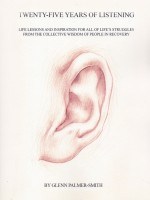Life Lessons and Inspiration For All of Life’s Struggles
From the Collective Wisdom of People in Recovery
Review by Thomas B.
My name is Thomas and I am an alcoholic. I have been sober for 48 years and I have learned a lot as I listen to other people in recovery. That’s what Glenn’s book, Twenty Five Years of Listening, is all about.
A truly interesting book.
But first let me tell you a bit about my own recovery… and how “listening” helped.
I’ve been gifted with recovery from addiction to the liquid, legal drug, alcohol — preferably Colt .45 in sixteen ounce cans by the case lot — in the rooms of AA, since I attended my first meeting in New York City on a chilly, rainy Thursday evening in late October of 1972. I didn’t go to that meeting to stop drinking; I went to get my second wife back!
Since that first Thursday night AA meeting, I’ve been “blessed” to attend meetings throughout many of these 49 United States, to include Hawaii, as well as in Ontario, Canada.
For the past year, I’ve lived (again) in Tucson AZ, the home of Wally P., who does Back to Basics workshops throughout North America.
Fellow members of my home group bring their copies of Big Book, most copiously underlined with multi-colored markers to every meeting. As well, a number are enclosed in fancy leather Big Book Blue binders with an insert to hold their latest sobriety coin.
Truth be told, I’m somewhat envious of their simplistic devotion to a book first published on April 10th of 1939, whose biblical first 164 pages haven’t been substantially altered in any way subsequently except to correct obvious typos.
But I am not one of them. I find the Big Book ancient and now rather irrelevant. I read many, many books from folks in secular AA. I wrote my own and it is called Each Breath a Gift. And one of most recent and wonderful books Staying Sober Without God.
Now back to the original topic!
I enjoyed Twenty-Five Years of Listening. Glenn got it right: there is so much to be learned in recovery and what you hear at AA meetings can indeed be helpful and even inspiring.
Following a short poem, “Listen” and a brief introduction. Glenn divides his book into the following six sections.
- Addiction
- Funny
- Acceptance
- Advice
- Inspiration
- Relationships, and
- Taking Charge of Your Life
 In addition to being an accomplished chronicler of what he has heard at meetings, Glenn is also a gifted artist; scattered copiously throughout the written pages are pencil sketches he’s drawn of alcoholics at the New York City meetings he attends, being careful, he notes, to protect their anonymity.
In addition to being an accomplished chronicler of what he has heard at meetings, Glenn is also a gifted artist; scattered copiously throughout the written pages are pencil sketches he’s drawn of alcoholics at the New York City meetings he attends, being careful, he notes, to protect their anonymity.
One of several reviewers on the back cover, Robin K., states,
Twenty-Five Years of Listening puts a real face on recovery in contemporary language with sketches of Glenn’s fellow travelers to give a human form to the ideas expressed. What they have to share has universal value to anyone searching to live a happier, peaceful and more fulfilling life.”
To end this book review, I’ll quote two or three of the pithier quotes from each of the six chapters to give you a taste of the wisdom contained in this excellent addition to literature about recovery from addiction.
Addiction
Alcohol gave me wings to fly and then took away the sky.
If twelve steps is too much to handle try two steps.
Step out of your house. Step into a meeting.
Funny
For me having a drink was like having sex with a gorilla.
It’s not over until the gorilla says it’s over.
Some people drink normally. I normally drink.
Acceptance
I wish I could tell you it gets better.
It doesn’t. But YOU get better!
Sooner or later we all sit down to a banquet of consequences.
Accept what is, let go of what was and have faith in what will be.
Advice
You can be narcissistic or compassionate, but not at the same time.
Do what you love and the money will follow. Maybe not enough to pay the rent, so don’t give up your day job.
Inspiration
If I can let go of what I think I should be, then I have a change of becoming what I might be.
I finally have a life I have no wish to take a vacation from.
Relationships
I am so codependent that when my girlfriend holds her breath,
I turn blue.
When you judge someone, you aren’t defining them. You are defining yourself.
Inside every woman sleeps an angel, a princess and a demon. The one you wake up will be the one you get.
Taking Charge of Your Life
You are the world.
The door is you and the key is you.
Only you can give yourself the key and open the door.
Actions prove again and again why words mean nothing.
So, there you have it – some idea of what Twenty-five Years of Listening can offer you.

Click on the cover to see the book on Amazon.
For myself, I found it intriguing, not only for what I read, but also for the wonderful pencil sketches of AA attendees he captured – I kept trying to identify them from the scores of meetings I attended in New York City throughout the thirty-five years I lived in or near Manhattan.
If you want a welcome alternative to the sometimes hackneyed official literature of AA recovery, I strongly recommend this book. It will offer you, as it did for me, numerous examples of the common wisdom that is always available within the rooms of Alcoholics Anonymous:
If we take the time to carefully listen…
“Glenn S. is a recovering alcoholic, a ‘Richard Dawkins atheist’ who helped found three humanist AA meetings in New York City, and an artist who for twenty-five years brought a sketchbook to meetings where he took notes and sketched the people around him.”
To listen to a podcast with Glenn and John S, posted on AA Beyond Belief on December 2nd, click here: Episode 199: Twenty-Five Years of Listening.
Thomas has been active in AA general service since he attended his first meeting on the Upper Westside of New York City on October 19, 1972. He was co-chair of the first New York City Young People’s conference in the spring of 1978. He’s been active in Secular AA since he attended the 2014 Santa Monica Conference. He helped establish secular AA meetings in both Seaside and Portland, Oregon. He’s written many articles for both AA Agnostica and AA Beyond Belief. His memoir, Each Breath A Gift, was published by AA Agnostica. He currently lives in Tucson, Arizona, and attends three AA meetings a week.
Counting today’s, Thomas has now written a total of 21 articles published on AA Agnostica:
- One Big Tent (September 23, 2018)
- 2018 ICSAA Toronto Conference (July 16, 2018)
- A Report of the Survey – The 2020 International AA Convention (May 17, 2018)
- Conference Question – Literature for We Agnostics? (March 29, 2018)
- Parallel Universes: The Story of Rebirth (March 1, 2018)
- A Secular Sobriety – Review (August 10, 2017)
- The Austin Convention – Survey Results (June 11, 2017)
- Bill Wilson, Always a Seeker (June 2, 2016)
- The Practical Tool of Meditation (April 21, 2016)
- Relevant Quotes for Secular AA (February 6, 2015)
- Identification (December 12, 2015)
- Why It Works (August 16, 2015)
- Bill Wilson’s Experience with LSD (May 10, 2015)
- PRAASA 2015 (April 12, 2015)
- Sponsorship in AA (February 22, 2015)
- Several Reports from the Santa Monica Conference
- Tradition Two: A Flaw in AA Service Structure? (September 28, 2014)
- Book Review: A Freethinker in AA (May 21, 2014)
- A Fellowship of the Religious? (April 20, 2014)
- One’s Religion is An Outside Issue (July 28, 2013)
- First AA Meetings (June 2, 2013)
He has also posted a total of nine articles on AA Beyond Belief:
- A Report on the Survey – The 2020 International Convention (May 17, 2018)
- Journaling (October 23, 2016)
- When I Decided to Stay Sober (August 14, 2016)
- A Tribute to AA Agnostica (June 15, 2016)
- Pacific Region Alcoholics Anonymous Service Assembly (April 24, 2016)
- My Experience as a GSR (March 13, 2016)
- WACYPAA, XIX (March 6, 2016)
- Compassion (March 6, 2016)
- Resentment, Rage and Recovery (October 25, 2015)
The post TWENTY-FIVE YEARS OF LISTENING first appeared on AA Agnostica.

 In addition to being an accomplished chronicler of what he has heard at meetings, Glenn is also a gifted artist; scattered copiously throughout the written pages are pencil sketches he’s drawn of alcoholics at the New York City meetings he attends, being careful, he notes, to protect their anonymity.
In addition to being an accomplished chronicler of what he has heard at meetings, Glenn is also a gifted artist; scattered copiously throughout the written pages are pencil sketches he’s drawn of alcoholics at the New York City meetings he attends, being careful, he notes, to protect their anonymity.